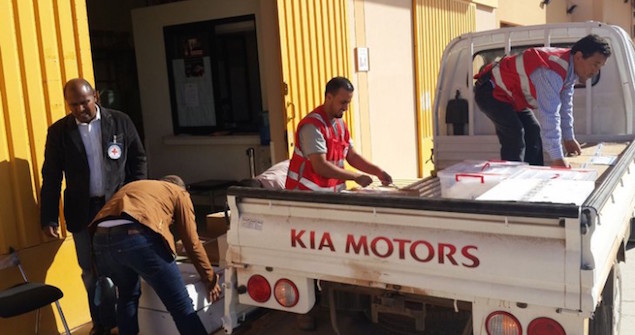Libya: Prolonged Conflict in Benghazi Displacing Thousands

Tens of thousands of people have had to flee their homes in Benghazi, Libya, as fighting within the city continues to intensify.
Sabri, Gawarsha, Gar Younas and Laiti are currently among the districts worst affected by the ongoing violence. Thousands of civilians from these areas are now displaced within the city of Benghazi itself, or have had to escape to neighbouring towns for safety.
Many of the internally displaced families as well as those still caught up in the fighting are being forced to manage things on their own. Others have been fortunate enough to be hosted by friends or family or have received some support from the Libyan Red Crescent Society (LRCS).
As the violence intensifies, so do concerns about the civilians caught up in the conflict. Their lives have changed dramatically and many now require humanitarian assistance. There are frequent problems with fuel, power and water supplies in many of the areas affected by the violence.
In Benghazi, services at the main hospital have been seriously disrupted. Many health workers have left the country and there is a severe shortage of medical supplies, which means there is very little or no access to health care.
Currently, the International Committee of the Red Cross (ICRC) is carrying out humanitarian work in Libya via 140 local staff, through four offices in Tripoli, Benghazi, Mistrata and Sabha, directly or through the LRCS.
Since July we have distributed food rations to 2600 families and essential household items to 4400 homes, and are working on reaching many more. We have donated vital medical supplies, surgical instruments and body bags to the Benghazi Medical Centre and have provided the LRCS blood bank in Benghazi with 6000 blood bags as well as a similar number of blood-giving sets to assist; but there is still so much more that needs to be done.
“We will continue to do our utmost to assist the victims of the conflict in Benghazi and Libya as a whole, despite these testing circumstances”, reports ICRC’s head of delegation for Libya, Antoine Grand. “We are reminding all parties to the conflict that they must respect health-care workers and facilities, and facilitate their work. The lack of safe access to health care that has resulted from the violence is likely to have significant humanitarian consequences”.
With the multitude of armed groups and militias involved in the fighting, it is extremely difficult to obtain safe access to provide help to civilians. The frontlines of the conflict keep changing and, politically, the context remains fluid and unpredictable, making it hard to determine how the humanitarian situation could unfold in the coming weeks and months.
As a humanitarian organisation we know that our work in Libya is far from over. We hope for the best but will also prepare for the worst. In the meantime, we will continue to do as much as we can for the people affected by the ongoing violence.
Yadira Galarza is online communications officer, ICRC Australia Mission.


